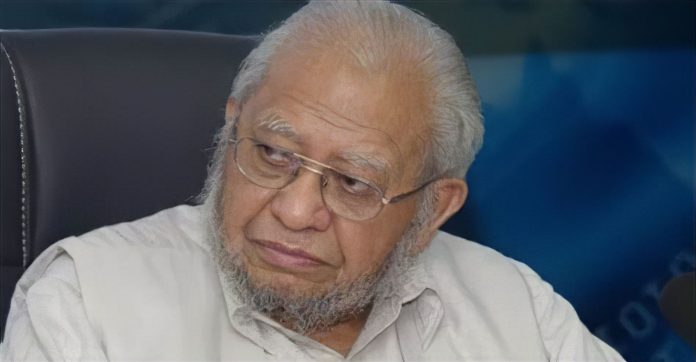– Saleena Karim
Professor Khurshid Ahmad, eminent Islamic economist, scholar and activist, passed away on April 13, 2025, in Leicester, UK, at the age of 93. His remarkable contributions to academia, politics, and civil society have had a lasting impact on the global Muslim community and beyond. The breath and extent of his work and influence is staggering, and there is insufficient space in a single article to encompass it all.
Born in Delhi in 1932 to a family that was active in the All-India Muslim League, Khurshid Ahmad migrated to Pakistan during the Partition, where he pursued higher education in economics and Islamic studies.
From the beginning he was keenly interested in Islamic economics, a discipline for which was to become a pioneer. He obtained degrees from Government College University Lahore and Karachi University, then continued in this specialisation at the University of Leicester as a research scholar. Leicester became his primary working base and home. He also received honorary degrees from the University of Malaya and Loughborough University.
Professor Ahmad’s vast literary legacy encompasses over 70 books in English and Urdu, as well as editorial work in serials and other publications. His writings on Islamic finance and economic systems challenged conventional models and advocated for ethical, interest-free alternatives rooted in Islamic principles.
In 1973, alongside Khurram Murad, he co-founded the Islamic Foundation in Leicestershire, UK. Under his chairmanship, the Foundation became a centre of Islamic scholarship, publishing and interfaith dialogue, fostering a deeper understanding of Islam in the West and contributing to Muslim thought in the UK. He was also rector at the Markfield Institute of Higher Education.
In Pakistan, Professor Ahmad established the Institute of Policy Studies in Islamabad, and served as a senator (1985-2012) and federal minister (1978-79). As both an academic and religious scholar, he was a lifelong member of the Jamaat-i-Islami movement. He was a close associate of its founder Maulana Abul A’la Maududi, whose works he translated and edited for a wider audience. He served as deputy chief of Jamaat-i-Islami for nearly twenty years, and had a major role in shaping the party’s economic and political vision.
Professor Ahmad’s influence was not confined to academia. As a senator and federal minister in Pakistan, he played a pivotal role in policy development, particularly in commerce and planning. His tireless dedication earned him numerous honours including the Islamic Development Bank Prize in Islamic Economics (1989), the King Faisal International Prize (1990), and the Nishan-e-Imtiaz (one of Pakistan’s highest civil honours, 2011).
Beyond his professional achievements, Professor Ahmad was also a mentor and guide to countless individuals, including scholars and leaders who continue to build upon his legacy. I count myself among those who have benefitted from his generosity in the pursuit of knowledge. His love of sharing literature was pivotal in the publication of my work, for which I will always be grateful.
Among his colleagues and friends, Professor Ahmad will always be remembered for his humility, his kindness, and his remarkable ability to connect with people of all ages and backgrounds, especially the youth. Dr. Wajid Akhter, Secretary General of the Muslim Council of Britain, has aptly said that we owe Professor Ahmad “a profound debt” for all that he has done in the service of Islam.
May the Almighty reward him for his efforts, and may his soul rest in peace.
[The writer (Saleena Karim) is a publisher (Libredux) and author based in Nottingham, UK.]




